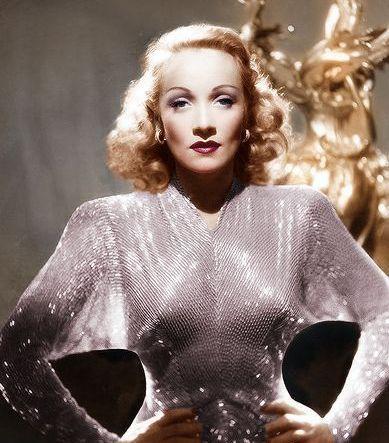
Summer Under the Stars, August 22: Marlene Dietrich
It was 1929, and Marlene Dietrich was appearing on the Berlin stage when Austrian-American film director Josef von Sternberg first caught sight of her. Something in her attitude intrigued him and he thought she might be right for the female lead in his next film, The Blue Angel, to be Germany's first sound film and produced in both German and English-language versions.
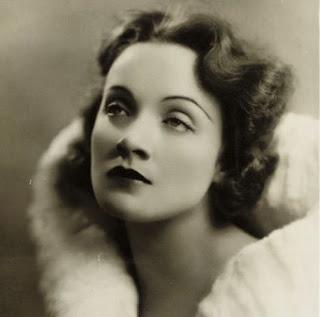
Marlene Dietrich, 1930, by Irving Chidnoff
Dietrich later protested, "My so-called biographers eagerly published a long list of films in which I had appeared at that time and supposedly played leading roles. This is not so. When Josef von Sternberg chose me for The Blue Angel, he was hiring an unknown."She was cast as Lola Lola, a singer/dancer in a tawdry dive called "The Blue Angel," a more wanton and fleshy seductress than those the actress would later portray. Dietrich's transformation from curvy brownette to svelte blonde would become a subject of some conjecture.
She credited her changing onscreen appearance (and quite a bit more) to her director. Von Sternberg, she said, had placed the main spotlight very low and far away from her to add prominence to the roundness of her face, "No hollow cheeks for The Blue Angel," she would write. "The secret face with the hollow cheeks," the look she became famous for, "was achieved as a result of placing the main spotlight close to my face and high above it." From von Sternberg, Dietrich learned a tremendous amount about lighting and camera; so much so that her knowledge was often greater than that of directors and cameramen she worked with after their collaboration ended. And, to ensure she was being photographed to her best advantage, she came up with the idea of watching herself while filming by placing a full-length mirror next to the camera.
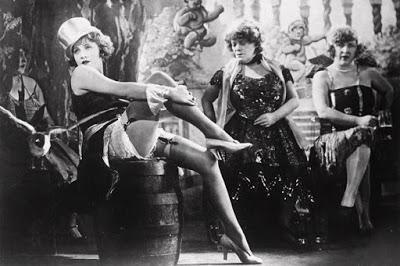
Marlene Dietrich's break-out film, The Blue Angel (1930)
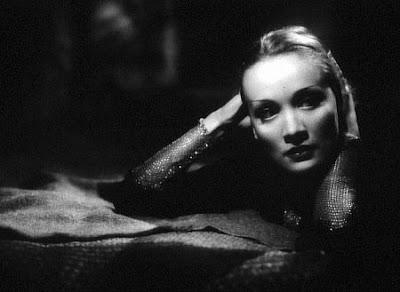
Shanghai Express (1932)
On August 22, Turner Classic Movies' salutes Marlene Dietrich with a full day of her films during its Summer Under the Stars celebration. Two of the six fantastical films she made with her mentor, Josef von Sternberg, will be featured: their first - The Blue Angel, and their most popular - Shanghai Express. A few more of her must-see films are among the ten others being shown on Dietrich's day:
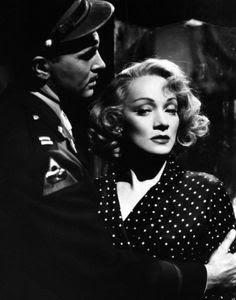
In A Foreign Affair (1948), with John Lund
Billy Wilder's A Foreign Affair was the second American film Dietrich made following World War II. The plot centers on a triangle involving a U.S. Army officer (John Lund) in occupied Berlin, an ex-Nazi cabaret singer (Dietrich) and the American Congresswoman (Jean Arthur) who is investigating her. Although second-billed to a very fine Arthur, Dietrich's performance is the showpiece. Wrote Bosley Crowther in his review for the New York Times: "...it is really Marlene Dietrich who does the most fascinating job as the German night-club singer and the charmer par excellence. For in Miss Dietrich's restless femininity, in her subtle suggestions of mocking scorn and in her daringly forward singing of "Illusions" and "Black Market," two stinging songs, are centered not only the essence of the picture's romantic allure, but also its vagrant cynicism and its unmistakable point."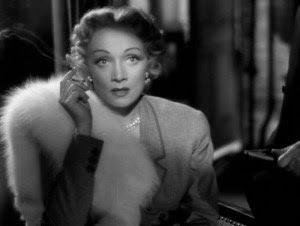
Stage Fright (1950)
Mostly dismissed by critics (though a box office success at the time of its release), Alfred Hitchcock's Stage Fright is worth taking the time to sit down and watch, if one accepts that the murder mystery at the film's core is convoluted, that there are almost too many pivotal characters to count and that the opening flashback misleads. Hitchcock biographer Donald Spoto has called Stage Fright a "comic masterpiece," while noting that it is "a film demanding the most careful attention."During one of his interviews with Francois Truffaut, Hitchcock revealed that two things attracted him to Stage Fright: it was a story about the theater and, when the book was published, reviewers mentioned that it could be "a good Hitchcock picture." He admitted to Truffaut, though, that he had problems with Jane Wyman, who shared top billing with Dietrich. Wyman was playing a young actress who, in trying to solve a murder, disguises herself as a ladies maid to Dietrich, an established actress and the prime suspect. Hitchcock said, "...she should have been rather unglamorous; after all, she was supposed to be impersonating an unattractive maid. But every time she saw the rushes and how she looked alongside Marlene Dietrich, she would burst into tears. She couldn't accept the idea of her face being in character, so she kept improving her appearance..."
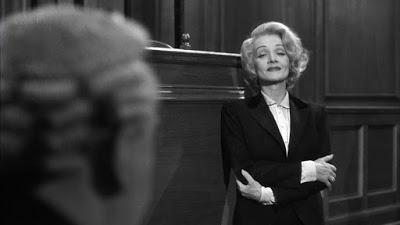
Witness for the Prosecution (1957), with Charles Laughton
Billy Wilder's Witness for the Prosecution has been described by some as one of the best "Hitchcock films that Hitchcock didn't make." Adapted from Agatha Christie's popular stage play and nominated for six Oscars, it is always at or near the top of lists of the greatest courtroom dramas on film. Boasting an all-star cast - Tyrone Power as an accused murderer, Charles Laughton as his defense attorney and Marlene Dietrich as the wife the accused - Witness for the Prosecution was one of the most ballyhooed and popular films of 1957.
The story is set in London and Dietrich portrays a German-born, one-time actress who met her Allied soldier husband in Germany during WWII and returned to England with him after the war. But Marlene's involvement in Witness for the Prosecution went beyond a role that could be interpreted as a glimpse into what became the future of her character in A Foreign Affair. Dietrich's additional participation required dogged determination and hard work and included some intense dialect coaching courtesy of Charles Laughton. Without giving anything away, it can be said that her efforts paid off to the extent that Wilder warned her, "You'll never get an Oscar for this. People don't like to be made fools of." Whether he was right or wrong, Dietrich did not receive a Supporting Actress nomination for Witness; her sole Oscar nod would be a Best Actress nomination in 1930 for Morocco, the film she credited with making her a star.
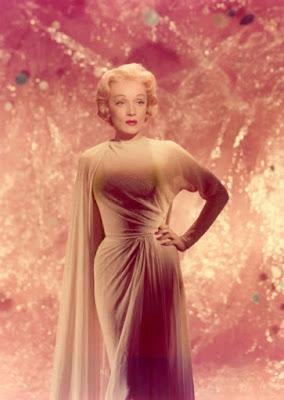
The concert years
Marlene Dietrich's film work virtually ended in the early 1960s when she began to focus entirely on the second career she began in the 1950s as a highly paid concert star. Her last credited screen roles were in Touch of Evil for her friend Orson Welles in 1958, Judgment at Nuremburg in 1961 and Just a Gigolo in 1976.Late in her life, she was the subject of two worthwhile documentaries. One, Marlene Dietrich: I Wish You Love, featured her concert act and was presented as a television special. The other, Maximilian Schell's extraordinary 1984 biographical documentary, Marlene, featured only Marlene's voice (she insisted her face not be filmed) along with archival footage, stills and commentary.
By the time one of her biographers, Charlotte Chandler, met her in Paris in 1977, Dietrich was in the process of "closing the door," that is, disappearing from the public eye, as so many great beauties do once their looks have gone. She would confide to Chandler, "It can be a curse being beautiful, after a certain point, as it slips away, as age steals it." And yet, French actor Sacha Briquet, who knew her in her late years, remembered, "Even bed-ridden she was the most beautiful old lady I'd ever seen. There she was with no makeup but still beautiful skin, big blue eyes and little hands fluttering like small birds in the air. She smelled beautiful, too, like roses."
Her life spanned almost all of the 20th century, from 1901 until 1992, and she was a star for more than 60 of those years. Today, her tantalizing legend lingers.
~
This post is my contribution to the Summer Under the Stars blogathon hosted by Journey in Classic Films; click here for links to all participants.
Click here for TCM's Summer Under the Stars schedule of Marlene Dietrich films.
References:
Marlene by Marlene Dietrich, translated by Salvator Attanasio (Grove Press, 1989)
Marlene Dietrich by Maria Riva (Knopf, 1992)
New York Times, Bosley Crowther review of A Foreign Affair, July 1, 1948
The Art of Alfred Hitchcock: Fifty Years of His Motion Pictures by Donald Spoto (First Anchor Books, 1992)
Hitchcock by Francois Truffaut, with the collaboration of Helen G. Scott (A Touchstone Book, 1985)
Marlene: A Personal Biography by Charlotte Chandler (Simon & Schuster, 2011)
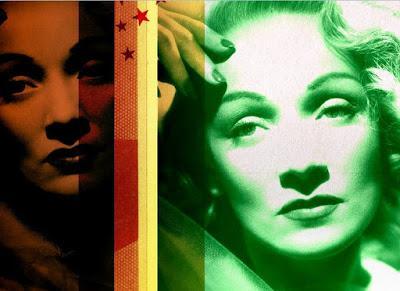
Summer Under the Stars 2015

